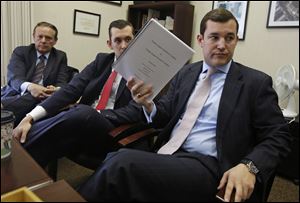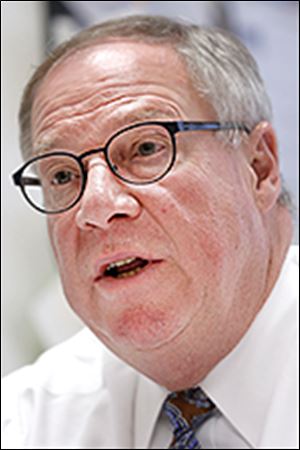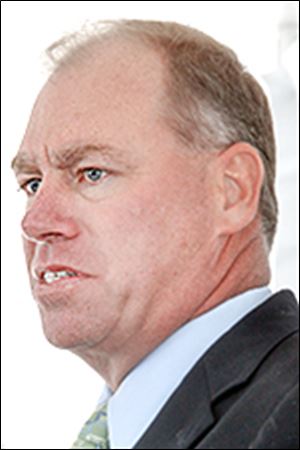
TOLEDO EXPRESS AIRPORT
Treece study posted online; officials say ideas not new
Accuracy of report called into question
12/7/2013
Collins
THE BLADE
Buy This Image

From left, Dock Treece, and sons Ben and Dock David, meet with Blade editors about their proposal to to privatize Toledo Express Airport on Wednesday, Dec. 4. Dock David is holding the proposal.
The Treece family of Sylvania Township on Friday unveiled another piece of its proposal to take over and operate Toledo Express Airport — a “Marketing and Marketability Assessment” that identifies potential aviation business — but airport officials said it doesn’t break new ground.
The study highlights what it says are advantages of a public-private partnership, but leaves unexplained questions about who benefits from handing control, and even ownership, of one of the city’s most prized institutions to local private operators.

Collins
Dock Treece, 63, and his two sons, Dock David Treece, 26, and Benjamin Treece, 25, partners in Treece Investment Advisory Corp., say they are rolling out their privatization idea in pieces to give the public time to absorb the complex issues.

Toth
The 86-page document was produced by Airport Business Solutions of Tampa, at a cost of $60,000 to $70,000 to the Treeces, they have said. The report was posted Friday morning on the Treeces’ airport business Web site, toledoairports.com.
After a day on the Web, the study’s accuracy was being questioned. The report incorrectly attributes the airport’s ownership to the Toledo-Lucas County Port Authority; it is owned by the city of Toledo and managed under a long-term lease by the port authority.
RELATED DOCUMENT: Marketability study of Toledo Express and Toledo Executive Airport
The report’s author, consultant Michael Hodges, said he knows the city owns the airport and acknowledged if the report says otherwise, it’s not correct. He said the study’s focus pertains to opportunities for new aviation-related business at the airport, regardless of who owns it. The study is dated Nov. 4.
The unsolicited proposal from the Treeces has generated a public discussion over whether the airport should be privatized. In recent weeks, public officials have curtailed their availability to the Treeces because of the lack of a detailed business plan. Any change in airport management would have to go through City Council, which has seen no legislation.
“I would sincerely hope that if this was a freelance effort on the part of the Treeces, they would fully expect the city would be open to seeking other options or other proposals as well,” Mayor-elect D. Michael Collins said. “I would not look at just one proposal and say, ‘That’s it.’ ”
Mr. Collins, who was returning from a mayoral training seminar at Harvard University on Friday, said his office had not received a copy of the study. Current Mayor Mike Bell also did not receive a copy, a spokesman said.
Jerry Chabler, chairman of the port authority’s airport committee, said the study “regurgitates” information about the aviation industry known to the port authority, while getting an important fact about the airport’s ownership wrong.
He said the public is still missing information, such as the Treeces’ financial projections, names of their contractors, and names of their banks and financial backers.
“Who are the qualified managers? I want to see their names,” Mr. Chabler said. “I’m very skeptical of folks who have never operated an airport being able to do it better than the port authority.”
He said if the Treeces want to grow the airport, they should buy some airplanes and launch a passenger or cargo business from Toledo Express.
Jim Renda, business development manager for Grand Aire Inc., a fixed-base operator at Toledo Express, said he has concerns with a proposal to consolidate fuel sales now provided by the fixed-base operators into one fuel storage system. “There’s not a full understanding of what we as fixed-base operators do,” Mr. Renda said. “I would like some sources cited for the information. We were not consulted.”
He said he applauded the Treeces in showing an interest in bringing business to the airport. He said his company rents space to the elder Dock Treece’s jet.
Paul Toth, port authority president and chief executive officer, a former director of the airport, said he had not been provided with a final copy of the study but had been shown a draft in October.
“My board chairman said it’s not a business plan. It basically said what we already know, some of it being accurate, some of it not being accurate,” Mr. Toth said. “From the very beginning, the leadership of my board basically said, ‘We’re skeptical. We’re not going to close the door and say no, we’re willing to look at a business plan, but we’re very skeptical that anything like this could work.’ Based on what I read in the draft, I would say there was nothing in there that presented an opportunity that we hadn’t considered at some point in time.”
Dock David Treece, managing member of the Treece airport company, said the family is promoting a concept that would be positive for northwest Ohio.
“We’ve been doing due diligence for more than three years and spoken with some of the best consultants available for aviation, legal, title work, and other relevant areas, giving us the confidence that we understand the issues facing Toledo’s airports and the ways to turn them around better than anyone else,” Mr. Treece said.
Their proposal is for a 30-year lease with an option to buy properties connected to the airport. Mr. Treece said they have determined the values of the properties, but the report doesn’t identify those properties or the values they’ve determined.
The city would be paid for the sale of any city-owned property, but the city would not get a share of profits on any subsequent development, other than in connection with an existing revenue-sharing arrangement such as a joint economic development zone, Mr. Treece said.
At the same time, the Treeces have said they would take on the risk of financial failure of the project, and that they are not proposing to charge the city a management fee.
The study offers clues as to the kinds of businesses the Treeces would delve into if they had control of the airport, along with Toledo Executive Airport in Wood County: International air cargo; scheduled passenger air charter services; maintenance, repair and overhaul, defense contractor and aircraft painting facilities; air park development, and flight training.
It devotes several pages to the idea of a public/private partnership and its benefits, including that a private operator would be able to pay lower salaries.
The study notes that private-sector participation can take various forms, including managing the airport and long-term lease of assets, and cites as one example Albany International Airport.
Airport spokesman Doug Myers said the county-owned airport is operated by the Albany County (N.Y.) Airport Authority, which contracts with a management company. He said the management company does not lease the airport or have any purchase options — two key elements of the Treece plan.
An expert consulted by The Blade said that outright privatization of publicly operated airports is rare in the United States because of the complexity of Federal Aviation Administration regulations and the cost of repaying the FAA for its investments in public airports when property is sold or revenue is diverted from the airport.
Contact Tom Troy: tomtroy@theblade.com or 419--724-6058 or an Twitter @TomFTroy.